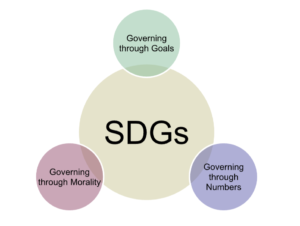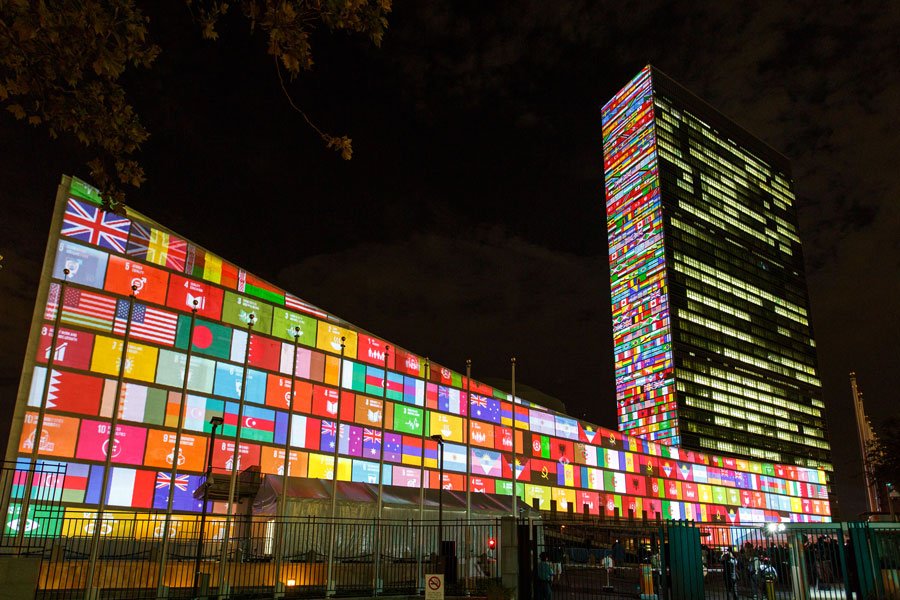SDGs as Global Governance of Education
In this blogpost, which is part of the NORRAG blog series on “International Organisations and the Global Governance of Education”, William C. Smith, Melanie C.M. Ehren and Sotiria Grek argue that the SDGs illustrate the increased use of soft governance in the global governance of education. The blogpost draws largely on an article by the authors that is included in a recent special issue on ‘The Sustainable Development Goals and the Global Governance of Education’.
Ten years into the Sustainable Development Goals (SDGs), the SDGs have increasingly been embedded into national discourse and planning, as well as our everyday activity. They have been adopted as the standards for government success – such as the National Performance Framework in Scotland, used for the alignment of regional plans – such as the African Union’s Agenda 2063, and directed the revision of education curriculum from the primary to tertiary level – seen in the UK, Taiwan, and Qatar, amongst others.
Given the influence global goals can have, our recent special issue ‘The Sustainable Development Goals and the Global Governance of Education’ set out to explore how the SDGs have been shaped and further shape the activities and plans of nation-states. Global governance is increasingly recognised in the education space, as governance extends beyond the nation-states and an increased number of intergovernmental organisations, civil society and private sector actors work collectively toward a global common interest.
SDGS and increased use of global goals
Global goals, such as the SDGs, represent a continual shift in the international arena away from setting rules that legally bind nation-states to certain behaviours and sanction those that misbehave, to establishing collective norms, expectations, and aspirations that nation-states voluntarily adopt. This evolution illustrates the increased use of soft governance in global governance.
SDGs as product & mechanism
The SDGs are a product of the diverse, multi-stakeholder space of global governance. The array of actors from different political, economic, and cultural backgrounds proposed a wide-ranging set of goals. The SDGs were the product of this contested negotiation between actors with background documents in the run up to the SDGs reflecting differences in ideologies and views of education quality and inclusion. Still, despite being hailed as on the most inclusive processes in UNESCO history, local actors at the sub-national level were largely absent. Additionally, the increased number and breadth of actors in negotiations may have done little to change the power dynamics associated with the final outcome. As Chung and colleagues mentioned, “expansion of participation does not consequently bring power balance, as sharing responsibility does not necessarily mean sharing of power.”
Despite its shortcomings, the creation of the SDGs did more to increase the voice of nation-states, civil society, and other sectors of society than prior goal creation. Soft governance was better able to accommodate the varied interests present and foster consensus, than sanction-based hard governance approaches. The end product was the broad and ambitious overarching goal of SDG 4, “Ensure inclusive and equitable quality education and promote lifelong learning opportunities for all”. To meet the goal 7 targets and 3 means of implementation were identified with an initial 11 global and 32 thematic indicators to track global and national progress.
While the SDGs can be viewed as a product of actors working to influence the SDGs to meet their needs, the SDGs can also be understood as a mechanism, independently influencing the discourse and activity of nation-states. This is done through three governance channels: governing through goals, governing through numbers, and governing through morality.

Some have argued that the SDGs are “based on the principle of ‘governing through goals’”. Four characteristics combine to make the governing by goals approach unique:
- Non-legally binding goals permit participation without fear of sanctions
- Institutional arrangements are weak making hard governance approaches difficult
- Goals are broadly framed providing space for countries to adapt the goals to their needs
- Goal setting is more inclusive increasing nation-state buy-in
Once agreed upon the global goals detail what is the acceptable behaviour for nation-states.
SDGs also influence through the soft power of numbers. Connecting goals to indicators and time specific target orient country behaviour in a certain direction. The numeric properties of indicators “create mobile knowledge which travels cross different contexts” making it easier and more acceptable to compare across states. Naming and shaming is then often applied to motivate change in policy and practices.
The SDGs have also captured the global discourse, identifying the goals as the common interest that all nations should be working towards. The moral positioning of the SDGs bring with them a force in which non-compliance is viewed as ethically unacceptable. Countries are compelled to participate as the SDGs have effectively “re-conceptualized development as a universal aspiration for human progress”.
In this Special Issue
Articles in this special issue focus their attention on the SDGs as a product or mechanism of global governance. Articles by Elaine Unterhalter, Jhon Jairo Ocampo and Lira Luz Benites Lazaro, and Antonia Wulff concentrate on the SDGs as a product. They broadly address questions such as whom does the SDGs represent and how has the diversity of actors in the development of the SDGs reshaped who engages in the global governance of education. Articles by William C. Smith and colleagues, Shoko Yamada, and Teklu Abate Bekele illustrate how the SDGs are an independent mechanism of global governance. Their work explores how SDG 4 exerts influence and how the goals have been adopted, adapted, or rejected locally.
Implications for future goals
With plans for the post-2030 goals in its early stages, it is important to understand how prior global goals have been created and what more inclusive participation may mean for progress. We also need to recognise the independent, and often indirect, influence goals have on nation-states. Additional, particular attention should be given to how we structure future iterations and how that structure can motivate activity to both desirable and undesirable ends.
To register for the virtual launch of the special issue on 15 November, click here.
The authors:
William C. Smith is a Senior Lecturer in Education and International Development and Director of Internationalisation at the Moray House School of Education and Sport, University of Edinburgh. His research foci include the role of international organisations and global goals in shaping national education policy, education access and barriers to education for the most marginalised, and issues around testing, teachers and accountability. He has published over 50 articles, chapters and reports and has previously worked in the global governance space as a Senior Policy Analyst at UNESCO’s Global Education Monitoring Report and as a Thomas J. Alexander Fellow at the OECD.
Melanie C. M. Ehren is a Professor in Educational Governance and Head of Education Sciences at the Vrije Universiteit Amsterdam. She combines a strong disciplinary background in educational and school effectiveness with a comparative approach to understanding outcomes of education systems. Her international work on educational accountability, trust and improvement has included various countries in the EU, Africa, Asia and the U.S, including visiting scholarships at Harvard University and Columbia University and consultancies for the OECD, UNICEF, and the EU.
Sotiria Grek is Professor of European and Global Education Governance at the School of Social and Political Science, University of Edinburgh. Sotiria’s work focuses on the field of quantification in global public policy, with a specialisation in the policy arenas of education and sustainable development. In 2017 she was awarded a European Research Council (ERC) Starting Grant, entitled “International Organisations and the Rise of a Global Metrological Field” (METRO, 2017–2022). Her most recent books (with Justyna Bandola-Gill and Marlee Tichenor) are Governing the Sustainable Development Goals: Quantification in Global Public Policy (Springer, 2022) and The New Production of Expert Knowledge, Education, Quantification and Utopia (Palgrave, 2024).


The problem here is that the fourth Sustainable Development Goal is now acting as a straitjacket, constraining the actions and aspirations of those seeking to confront education’s worldwide challenges through the sensitive and ingenious application of contemporary technology and Artificial Intelligence. Please see: https://www.norrag.org/shaking-free-from-the-sdg4-shackles/
Are the SDGs and other global goals really “soft governance” or more of a diversion? After all, basically none of the early UNESCO UPE and literacy goals were ever met; neither have the EFA goals or the MDGs nor will any of the SDGs by 2030. To me, what is really happening is what Hans Weiler called compensatory legitimation, where the state tries to retrieve its eroding legitimacy by goodwill gestures while the actual state of the people continues to deteriorate. From a progressive perspective, the unfulfilled promises and the attempts at legitimation are interrelated parts of our world system. Increasing poverty and inequality, pervasive racism and sexism, widespread conflicts, the danger of nuclear confrontation, and the specter of climate catastrophe all call into question the legitimacy of the social order. To compensate for this, actors in the world system of neoliberal globalization must introduce polices, for example, EFA, the MDGs, and the SDGs, aimed at ameliorating some problematic conditions and thus restoring legitimacy to our social order. This argument does not question the good intentions of the proponents of these policies but does question their effects. Simply having these policies appears to be sufficient for compensatory legitimation; providing the needed resources and bringing about the needed structural changes to fulfill these promises, judging by past experience, seems not to be forthcoming. This does not have to be so. We could achieve UPE and most of SDG4 in a very few years if we were willing to devote a relatively small portion of global resources to this cause. Even the resources necessary to achieve all the SDGs only amount to 1% to 4% of global GDP. Yet those resources are not forthcoming. Is this a serious effort or a diversion?
For what is needed, see my paper in https://www.sciencedirect.com/special-issue/10G3WN9BKV1
Hi Steve, I agree with you that the liberal world order many talked about in the global governance space following the end of the Cold War is weakened or fragmented. Many of the traditionally dominant international organisations do use their involvement in orchestrating the global goals to reclaim parts of their legitimacy. I also don’t these as mutually exclusive. Soft governance – and the turn from rule making to goal making – is a strategic approach to remain legitimate by trying to bring together the increasingly diverse set of actors around a broad goal(s). International organisations maintain their orchestrator role, actors get to read into the goals what they want and selectively choose what to prioritize and implement – without fear of sanctions or repercussions. It makes for good participation with the goals – at least at the surface level – with questionable progress. Very much agree with you that part of the solution is political will and sufficient resources.